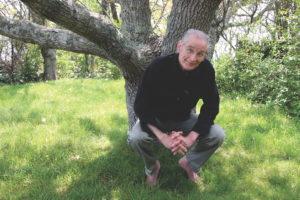Roger D. Skillings died peacefully on the night of Jan. 15, 2020, with his wife and daughter beside him. He was 82 years old and had been suffering from dementia for years.
Born in Bath, Maine in 1937, Roger graduated from Phillips Academy Andover and then from Bowdoin College in 1960. A cleft palate hindered his speech as a child, leaving him alone and fiercely attuned to the language that eluded his tongue but never his mind. He was a passionate reader and soon an obsessed writer. Moby-Dick was his bible, and the rotting wharves along the Kennebec River his heroic landscape. He arrived in Provincetown in the summer of 1966 and in 1969 was among the first group of writing fellows at the Fine Arts Work Center.

The author of eight books, mostly story collections, from Alternative Lives (1974) to Ptown Stories (1980) and The Washashores (2018), he was a singular stylist and a collector of the poetry of what people say, and of the stories we all live out. His wife, Heidi Jon Schmidt, said that the deep, surprising currents that drive stories were his great fascination, and if you told him a story, he would question you until unknown worlds had been revealed.
At the Fine Arts Work Center he found the kind of literary community he had dreamed of, and the place became his second life’s work. He served on the writing staff and writing committee for almost the entire history of the institution. He cared passionately about literature and the young people who aspired to make it. He leaves behind generations of writers inspired by his example and his friendship.
His love of his fellow storytellers led to some great real-life tales. He was passionately kissed by John Cheever at a party, lost in a thorny forest of the Provincelands dunes with John Ashbery, and ran out of whiskey at 3 a.m. at the Fine Arts Work Center with Seamus Heaney.
A brilliant reader who would seize on the raw talent in a manuscript and work relentlessly to convince others of an unknown writer’s worth, he was able help many writers finds the path to success.
Roger was so focused on his own values — a steely honor and fealty to the most complete truth he could know — that he barely recognized convention. In school he would walk out of a test as soon as he was sure he had passed. He wanted to go back to his real work. W.H. Auden’s admonition to writers, in his In Memory of W.B. Yeats, seems like a capsule of Roger’s philosophy:
“Follow, poet, follow right
To the bottom of the night,
With your unconstraining voice
Still persuade us to rejoice;
With the farming of a verse
Make a vineyard of the curse,
Sing of human unsuccess
In a rapture of distress”
This he did, and his beloved Provincetown was a source of endless inspiration. He thought on his feet, and somehow with his feet, walking every block in town thousands of times over the years he lived here. Even when he had forgotten the town’s name, he knew Commercial Street by heart and walked its length every day. As he withdrew into death, he was heard to ask, “Where might one walk?” as if he had landed on a new shore.
He leaves his wife, Heidi Jon Schmidt, his daughter, Marisa Rose Skillings, and hundreds of friends, who may have only heard him talk about the weather but recognized his spirit. He lived to “push the light of the English language a little further against darkness,” as E.M. Forster wrote.
A memorial service will be announced soon. Contributions in his memory may be made to the Fine Arts Work Center in Provincetown.



